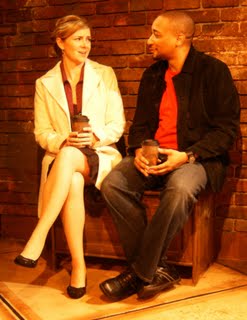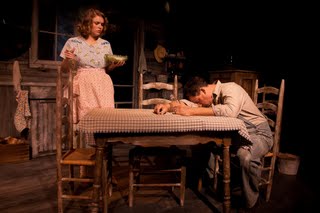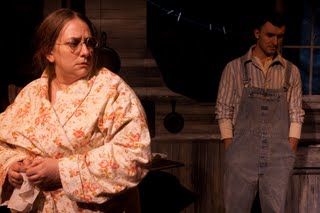|
|
Archive for November, 2009
Monday, November 30th, 2009
 I had such a great time at this show. I laughed from the opening set of lines and was genuinely touched by the final tableau. It is a wonderful little piece of theater, and it marvelously shows off the talents of the cast and crew and especially the director. This is a master class in directing comedy, where the two rules above all else are speed and honesty, and where underplaying and overplaying go in equal measure, hand in hand. I had such a great time at this show. I laughed from the opening set of lines and was genuinely touched by the final tableau. It is a wonderful little piece of theater, and it marvelously shows off the talents of the cast and crew and especially the director. This is a master class in directing comedy, where the two rules above all else are speed and honesty, and where underplaying and overplaying go in equal measure, hand in hand.
I have to say all that, because I want to make sure I’ve said that I loved being in the theater watching this play. I don’t want anything I’m about to say to read as a backhanded compliment. You see, this is a comedy, that derives its laughs from the situations the characters are put in. So… in truth… I hate to say it but… It’s just that, the right words for it are “Situational Comedy”. It’s a sit-com.
Wait, don’t jump up and down like that. It could be argued that the greatest American art form is the musical, but that’s actually bullshit. It’s the sit-com. Unless you think several hundred million people a year sit in their living rooms watching DVDs of “Finishing The Hat” and laughing their asses off. They aren’t, they’re watching TV, or DVDs of old TV. And our generation learned at the feet of sit-coms, as much as we want to quote Chekhov. This is how we speak.
But sit-coms belong on television, not in a theater, so why did I love this so much? Because, unlike so many other “playwrights” who seem to be stuck in the only medium they can afford, Blair Singer, the writer of this piece, is writing entirely for the theater. This is a language based medium, and the comedy is folded neatly, line by line, on top of itself. Television is about economy, and film is about epic vistas, but theater is about language, and Meg’s Best Friend delivers. It isn’t full of one liners, it’s full of eight liners, each joke massaged for less bang and better circumstances. These are not buffoons, they aren’t getting hit in the nuts. This is a serious look at the world that we’re waking up to, a serious attempt to deal with America in 2009… and it’s hilarious.
It opens with the characters explaining to one of their own that he’s a sexist. He denies it, but once they give him several examples it suddenly dawns on him that it’s true. In the next scene, a couple discuss what constitutes a “friend-friend” instead of a work associate, and one of them comes up with a ridiculous delineation, and it starts to dawn on you, these people don’t know who they are. Any of them. They don’t know where they fit into the world. They don’t know what their actions mean, and they don’t know how to relate to each other. They are like highly functioning social autistics. When they begin to betray one another and isolate from each other, it’s because their social lives are fundamentally dishonest, they don’t even know *how* to honestly interact.
And it’s perfect for us, for our world here in New York. And particularly perfect for The Production Company, whose work seems to always be looking at our generation’s misunderstanding of our identity. This piece is a wonderful companion piece to “Love”, where betrayal happens when we don’t know ourselves, and where one person’s otherness (In “Love” it was the woman’s obvious sex appeal, and in “Meg’s New Friend” it’s the man’s race) becomes the coin of the realm.
The difference, of course, is that “Love” was a harrowing drama, where you felt your heart being dragged across razor wire, and “Meg’s Best Friend” is really, really funny. Seriously.
I need to spend just a moment talking about Mark Armstrong. Even when I don’t like the scripts that he works with, his deft hand at crafting a play for the stage is always manically articulate. I saw the show opening night, and yet somehow the actors knew how to keep the flow of the scenes deadly tight, despite holding for laughs they couldn’t possibly know they were gonna get. The staging is meticulous, and it has to be with the space at Manhattan Theatresource. There are no black outs, there are no pauses, there is no awkward silence or brooding. These characters are using the language to sort out how they feel, they aren’t thinking thoughts and then saying them. Mark has every moment of the show activated, humming, like a bird in mid-flight.
More than that what he has done is assembled an extraordinary team of collaborators to keep the entire show pitch perfect. A special shout out to Isaac Butler for seamless and understated *sound design* and to April Bartlett for a brilliant and embedded scenic design, the sort of thing that many companies on our level don’t bother to do (ours included!). The cast is extraordinary, and I simply can’t say enough about Megan McQuillan and Damon Gupton. These two exemplify the tone that Mark has set, each playing as small as possible to make each moment honest. Megan was masterful with the language, punching and reeling and setting the tempo for each scene, and Damon was incredible with his face and body, assuming everything from a predator to a yogi with tiny adjustments simply to how he was standing or looking.
Mary Cross is in the play. I was in a play with her once, and… Look, I just adore her. I’m so crazy about her that I have no way of talking about her on stage. She made me laugh my lungs dry, and she made me cry last night, I think she’s a genius, but I can’t be trusted when it comes to Mary, you’re gonna have to go and tell me if I was right.
This is not a nut-kicking comedy. It’s interesting, there are two characters who become romantically entangled, and watching it, I thought “that works… but the heat between them isn’t really *crackling*. Too bad there isn’t more sexual tension…” and then, as the play develops, I started to understand. These two characters have been relating to the world as sexual creatures, of course they lean toward sex, but the warmth, the genuine affection they have – it’s more like friends. The only moment in the play that is allowed to breathe is the moment you realize that they’ve found an honest connection that is more than they were expecting. I don’t know if that is the brilliance of the actors, the brilliance of the director, or simply serendipity, but when the language is going a hundred miles an hour on top, and underneath there is an entirely different play happening, you know you’re seeing something really special.
Yes, it’s a sit-com. But it’s *our* sit-com, full of language that we use, and characters we recognize, and the situations we find ourselves in. Please know, I’m not dismissing it as a sit-com, I’m celebrating it. You should go see it.
Posted in Uncategorized | 2 Comments »
Wednesday, November 18th, 2009
Isaac has an interesting blog up about the assumption of bad faith in the theatrical blogosphere. I started posting over there, but GOOD LORD, I’m long winded.
In the writing that I do, I’m pretty upfront with the fact that I just really like the artform and generally enjoy myself regardless, but I do separate things into three four categories (roughly).
A) This wasn’t good. I save that for things that I think fundamentally disrespect the artform, for badly rehearsed, badly produced theater.
B) This didn’t work for me. Good piece of theater that *I* didn’t respond to. And I’ve used this for some of my closest working partners.
C) This was very good. Basically, I got what the company was doing, and I thought they did it well.
D) This is my kind of thing. Good, and also what I love to do myself.
It’s very difficult because we can’t write “In My Opinion” a hundred times for every damned blog entry. Now, this is easy for me because I modulate my presence just enough to be under the radar. But the divide between blogger and reviewer has to be recognized here. We’re not reporting on facts, we’re not claiming to be discussing things as they are – we are distilling the theatrical world and explaining what it means to each of us individually.
When we tell stories, we’re talking about each individual perspective, and our blogs are the same. When someone claims that your interpretation is too broad, it’s like the criticism we got for “Viral” that suicidal people don’t act like Meredith. Perhaps not ALL suicidal people do, but this one does, and perhaps your opinion doesn’t represent everyone, but it does represent *you*.
Posted in Uncategorized | Comments Off on Respone to Parabasis
Wednesday, November 11th, 2009
 I don’t consider myself a reviewer at all, and that’s because so much of my opinion of theater is informed WAY too much by a) gut reaction, b) my relationship to the people making the show and c) my understanding of how hard it all is. The difference between bloggers and reviewers is that bloggers are speaking from the inside out, and reviewers are measuring a play against some universal idea of a perfect theatrical experience. I can’t talk about what “one’s” response to a piece of theater will be, I can only tell you what each piece means to me, on that day, in those circumstances. I don’t consider myself a reviewer at all, and that’s because so much of my opinion of theater is informed WAY too much by a) gut reaction, b) my relationship to the people making the show and c) my understanding of how hard it all is. The difference between bloggers and reviewers is that bloggers are speaking from the inside out, and reviewers are measuring a play against some universal idea of a perfect theatrical experience. I can’t talk about what “one’s” response to a piece of theater will be, I can only tell you what each piece means to me, on that day, in those circumstances.
That being said, if you’re wondering how close your opinion will be to mine, then please start by seeing Retro Productions latest show “Holy Days”, because this show seemed to be crafted to knock my socks off. It is an intensely small show, a living room drama essentially (although the room in question is hardly a Victorian drawing room) which still encompasses so much of the human experience.
I’m gonna get to the sets and costumes in a minute, because despite the fact that they are breath-taking, it’s the story here that is so compelling. The play has a hint of Pinter, with judicious under-writing and long stretches of dialogue that feel almost like blank scenes. The story is two brothers and their wives, living on a farm in the middle of the dust-bowl, in the depths of the depression, but the circumstances serve to boil down the standard inter-family dynamics, like turning sugar-water to an acrid syrup.
There are actually seven characters here. The brothers, their wives, the child on the way, the child who was lost, and the dust. The dust exists as a physical manifestation of the horrors of the time, like a hand choking the farm, stealing their crops, stealing their farm… even stealing their children. I love it when plays are constructed with a ticking clock, and this family’s desperation, their proximity to starvation and destitution, is a silent countdown to destruction.
In some ways, we all hate our families as much as we love them. But, during holidays, when we’re all stuck together (say, an Easter Weekend), we just go see a movie. Or turn on the TV. Or go to a different room. This family has nowhere to go, no distractions, no entertainment save a deck of cards, which they use, still staring at each other across the table. But they want to talk about what’s going on as much as we do – not at all. So the tiny battles become life defining and the small annoyances become utterly maddening.
I get frustrated when people use the loss of a child in a play or movie because it’s usually a shorthand for depth. All of us will lose our parents and all of us will lose friends and possibly even spouses, so as a plot side-note, this doesn’t bother me, but none of us should lose a child, it’s an unnatural chain of events. Holy Days actually honors that, the loss of the child isn’t one of the things that happens, it informs the entire play, it is essentially a brilliant catalyst for all of the action.
Now, the first thing you notice at any Retro Productions show is that they do more with a theater space than just about any other company producing at our level. We all have to fight for verisimilitude in a world where a bench has to be a couch, or where a crappy couch has to be a nice couch, but Team Cunningham drenches you when you walk in.
It’s a farmer’s kitchen in the early 1930s, and while you are gonna be killed by the giant iron wood burning stove, and the perfectly horrible noise of the snapping screen door, the detail work is insane. There is a box of period matches sitting next to a DIFFERENT BOX OF PERIOD MATCHES. Two different brands. The cupboard in the back has the functional crockery that the characters uses, sitting next to a full compliment of crockery that nobody touches. It’s amazing. When the men enter the space and take off their hats, dust pours off them.
I admit, it says as much about what we’ve come to expect as it does the brilliance of the designers. But these guys are unwilling to live within the restrictions that most of us find ourselves in, and if it’s family connections that make these sets and costumes possible, then God bless ’em. My whole life has been a study in nepotism, and a noble failure means far less to me than gettin’ lucky with your folks. In their last show, a character orders toast at a diner, and the whole theater started smelling like toast. That just never happens.
The cast. My God. It could be argued that when you’ve got a four person cast, it’s easier to find personell, but if you’ve got twelve people and one of them isn’t very good, you don’t really notice. With four people, they all have to be insane and in this case, the cast is pitch perfect.
Cassandra M. J. Lollar, who had a very small role in Retro’s last productions, gets to show off her considerable skills in this piece. While it doesn’t seem to be explicitly textual, the white hot, jaw-clenching tension between her and her sister-in-law informs the entire play. Two women, who barely ever see anyone else, with two kitchens and two quickly emptying pantries… when one shows up with a home-made pie, it’s as intense as weightlifters at a gym. Lollar weighs every second, calibrating second-by-second to appear innocent when she’s aggressive and sweet when she’s conniving. She has crafted a surgically nuanced performance, with equal parts buoyancy and weight.
Most terrific looking people, like Lowell Byers, have a tendency to rely on their beauty to knock out the audience and then just do their lines and wear nice t-shirts. Byers has the physique of a swimmer and the pure good looks of someone who should probably be very famous in about six months… but while he’s here in our community, he’s working every moment. In much the same way as he did in “Look After You” in this summer’s Fringe Festival, he serves the play, not the other way around. He exudes such a calm, even temperament, just existing in each moment, underplaying his own existence. Our company isn’t producing anything until the fall of 2010, and it makes me sad because I’m pretty sure Lowell will be living in LA by then, missing the real work, but doing laps in a pool filled with cash.
Joe Forbrich is the kind of actor you pick a play for. Looking at his resume after the show, I found myself wishing I had also seen him in everything else he’s done. He’s playing a strong-jawed dust-bowl farmer in this play, but he never once veered into caricature. His steely resolve, melted only by the love he has for his wife… He’s teaching a master class in every performance, and every young actor should come see this play to watch him, and the others, so they know how to avoid tropes and simply tell a story.
 And Heather Cunningham… Look, there’s no money in theater, there’s barely any exposure and sometimes it feels as if we’re shoveling snow in a blizzard, so every project is, on some level, a vanity project. Anyone who denies that is simply lying. Even now that I’ve quit acting and haven’t been a part of writing in several years, the act of production, for me is judged purely by how many people tell *ME* that they liked it. And Heather Cunningham… Look, there’s no money in theater, there’s barely any exposure and sometimes it feels as if we’re shoveling snow in a blizzard, so every project is, on some level, a vanity project. Anyone who denies that is simply lying. Even now that I’ve quit acting and haven’t been a part of writing in several years, the act of production, for me is judged purely by how many people tell *ME* that they liked it.
But Heather continues to make h
eart scraping choices when she decides who she is gonna play and how. It isn’t interesting to watch a person be depressed, it isn’t interesting to watch a person mourn, and it’s deeply boring to watch passive aggression and self-denial in real life, it’s even worse on stage. So it is a great testimony to Ms. Cunningham that she saves the worst character for herself, a study in self-absorption and misery that still, somehow, simply pops off the stage.
I don’t actually know how she does it. I couldn’t. My most profound weakness as an actor is the implicit apology I carry around for being unattractive, my sense that every character I play is fighting, always, to achieve something, something noble. Heather has instead opted for a study in defeat, a zombie living with an unimaginable horror. And because of this, her small and intense redemption, the final admission of her sadness, carries a universal significance, and the room was filled with sobs. All vanity aside, it takes enormous courage to create this character inside this amazing story, and I’m slowly beginning to realize that there’s probably nothing Heather can’t do.
Of course, this play wouldn’t crackle the way it does without Peter Zinn’s invisible hand. It seems that directors are often separated into two categories, those who stage well and those who create realistic characters, but Mr. Zinn is articulate on both fronts. The hostility between the two women, while not overt in the script, was utterly necessary to keep the play moving, and the use of the fantastic set space created both a sense of the hollow outside world, and the claustrophobic living quarters – so much so that it seemed as if the playing space contained the only oxygen in the play, the every exit required holding your breath.
My only real criticism, and this does eventually land at the feet of the director, was in the sound design. Too often we could hear entrances and exits from upstage and when you’ve created this level of detail elsewhere, it really takes you out of the play. Also, when we switch from scene work to monologue, there is the terrible decision to play a piece of synthesized string music over the light cue. It was a god-awful sound and, in a play of such incredible nuance and subtlety, it seemed to suggest that the audience couldn’t be trusted. Believe me, we knew when it was direct address.
The play is set in the 1930s, the time of true American Gothic and amazing organic music. Spirituals, fiddles, dulcimers, drums, even just one person singing, this is one of the richest times in American music. It’s really a phenomenal mistake to play crappy spooky synths in the middle of this play.
But the rhythm of the production is impeccable. Had the actors decided to play only what was written, the show might have been ten minutes shorter, and would have lost everything in the process. Small lovely moments, a pregnant woman picking up a napkin, the making of coffee, the preservation of a pie with a piece of cheesecloth – these all show how important every inch of the property is, how precious each mouthful of food.
I’m not gonna say that this will be the best play you’re gonna see all year. But if you want to know what *I* find valuable in the theater, this play is it. I spend the first ten minutes of any production listening for the voice of the piece and then the rest of the show is translated for me, and I find that I can enjoy almost anything this way, even if it isn’t what I would want to produce. “Holy Days” speaks to me immediately, with a voice that I understand implicitly, and I’m so grateful that I got to see it.
Posted in Uncategorized | Comments Off on Holy Days
Monday, November 9th, 2009
“Politics is like music for people with no rhythm.”
It’s a marvelous line, and it serves so many functions in Gus Schulenberg’s new play “The Lesser Seductions of History”, being produced by Flux Theater Ensemble. I have had this argument many times with other theater people, (and my co-producers, on occasion) that people like going to see Micheal Bay movies because they like watching shit explode, people like going to musicals to hear great singers sing great songs, and people like watching plays for the moments of brilliant dialogue. For me, when I hear the writer’s voice instead of the character’s, it doesn’t usually ruin the piece.
And that’s why I like the line so much (and hope I’ve quoted it from memory correctly). Gus is willing to allow his characters to speak with as much charm and alacrity as well crafted characters are meant to, and in this production, the piece is set up so it needn’t contain any apologies for it. There are so many gorgeous chunks of writing, things like “Sometimes life isn’t about you, it’s about what you’re trying to protect” and the answer to “Does it feel good” is, simply and gorgeously, “it feels necessary…”
That first line, it’s a great piece of writing, but it’s a deeply unattractive thing to say, and one that I don’t think any artist would actually believe. And it stinks of truth, but it obviously isn’t, it’s this idea of truth that college types pronounce way before they’ve discovered how colorful the world is, how vague most truths are. Gus is allowing one of his characters to take pride in a pronouncement that the play doesn’t purport to support. For a lover of theater and a lover of words, (and I can only *honestly* claim the first, though I fraternize with the latter) this evening of theater is a lung inflating tight-rope walk, where you can’t help but pay attention for the next lovely turn of phrase, the next self-denying pronouncement.
But it’s much more than that. While it might be compared to “Our Town” (and in my mind, I kept flashing back to Mac Rogers’ “Universal Robots”) the truth is that this piece is so timely that it seems as if it couldn’t have been written before the day I saw it. Almost on the anniversary of President Obama’s election, we now know that Gitmo is open, that the wars rage unabated, that access to abortion is difficult, that access to affordable medical care is even harder, and access to equal rights for all people, regardless of their race, religion, gender or sexual preference is actually impossible right now… we need to talk about this. All of us who said, “Yes we can!”, we need to decide what we were saying yes to, and how much we are willing to sacrifice.
At the end of this play, one of the characters announces, in the Autumn of 1969, that she is pregnant. I was born in May of 1970. These are not my metaphorical forefathers, these are the actual people from whom I was born. And although we had a cultural flirtation with the 60s in 1989 (I remember the 20th anniversary of Woodstock, and everyone I knew had long hair and wore tie-dye), Gus is right, this is the time we have to look at these things.
I don’t want to kill you with spoilers because I really want you to see the play, but there is a moment when one character, speaking of the moon-landing, says “wasn’t all of it worth it?” and the answer, from the playwright and the production, is an unequivocal “YES”. And, referring to a different moment in the play, an hour later I said to my wife, “The man’s hands were broken beyond repair, but we elected a great man to be President. Wasn’t it worth it? Wasn’t the struggle worth it?”
I was talking to a friend about the defeat of gay rights in Maine last week, and he said to me, “I just feel like our generation, and those younger than us, don’t care if you’re gay. Gay marriage will happen because the people who hate gay people are all gonna die off, and I just can’t get too upset about it.” And as I said to him, “You have one kid. I have one kid. Every single one of my Mormon cousins has five, six or seven kids, and they are all being taught to hate homosexuals”, I thought back on this play.
Let me get some theater-slobbing out of the way. After watching this piece, I believe that Heather Cohn is one of the most exciting and smartest directors working right now, and I would add her to a very, very short list of directors that I would trust with *anything*. This is a far more difficult piece than it seemed, and she kept most of the cast on stage for the entire thing, and kept them all incredibly engaged and active. There wasn’t a dishonest moment in the evening, and when so much of it is direct address *driven* (if not actual direct address) it can be so easy to lean back on the standard Children of a Lesser God “this chair is my father” type nonsense, and that’s nowhere in this piece. It feels as if six months of rehearsal went into the creation of this play, and that is a rare feeling in the off-off world.
The ensemble was very strong but I found myself deeply drawn into two of the relationships even more than the others. Ingrid Nordstrom was engrossing as a NASA scientist and awkward lover to Kelly O’Donnel’s pitch perfect intellectual radical. These two women, both focused too much on their endeavors and too little on their love for each other – they were playing out the larger themes of the evening, but they never played any moment with a nod or a wink. They were utterly absorbed in the truth of each moment… God, it was so lovely.
And then, Micheal Davis and Raushanah Simmons, as brother and sister who are each distorted and chewed up by the great fight that was that decade, these two are an utter revelation. It could be the music, it could be my own sister and her horrible history, and how much of it I held myself responsible for, but their story made me feel like I had been sucked through a jet engine and dumped in a bucket. I would watch these two actors do almost anything.
My only criticism is that I didn’t really like the costumes choices. For an articulate and surprising evening, everything felt like… well, like what we all do in the off-off world. The set was limited in scope, but the director’s brilliance overcame the bareness of the space, the costumes just didn’t do anything to further the ideas in the show. And, for the record, it’s assinine for me to make this criticism, I think two of the characters in our last production were wearing my shirts.
The sound design and the light design were fantastic. Particularly the choices in music, the jazz, the piano stuff, the pop songs in the background. And even though when I later thought about it, the lighting design seemed a bit on the nose, I have to stick with my original thoughts on it while I was in the space, and I just loved it. There’s an effect at the end, at the climax of the play, that is worth three times your admission, and the lights go a long way toward making that work.
This is all on stolen time, this blog, and I wish so much I could take all the time I should talking about what a wonderful show this is. You will simply have to go, and write to me and tell me everything I missed.
Posted in Uncategorized | Comments Off on Historical Seduction
Tuesday, November 3rd, 2009
Today was Barnaby’s field trip to the farm, and I agreed to chaperone him, along with a slew of other parents. I was pretty excited because I thought it would be a great time for me to hang out with some of my other Stay-At-Home-Part-Of-The-Time-Gender-Inspecfics, but it turned out we were mostly chasing children. Here is a photo essay of the trip.
Click for LARGER.
 Barnaby was so excited to be on a “tool bus” that I thought he would be severely let down by the actual farm. This was his face when he saw that first tractor. Barnaby was so excited to be on a “tool bus” that I thought he would be severely let down by the actual farm. This was his face when he saw that first tractor.
 There was an area where the kids could chase the chickens. In the background is Hutch, who I put money on to actually catch one. He caught three. Barnaby ran in circles, screaming his head off and laughing, and completely ignored the chickens. There was an area where the kids could chase the chickens. In the background is Hutch, who I put money on to actually catch one. He caught three. Barnaby ran in circles, screaming his head off and laughing, and completely ignored the chickens.
 One of the more frustrating digital delay moments, as this cow had, one second earlier, been staring Barnaby right in the eye. One of the more frustrating digital delay moments, as this cow had, one second earlier, been staring Barnaby right in the eye.
 The audio portion of this photo would be Barnaby yelling, “Doat! What’s your name DOAT? My name is BARNABY!” The audio portion of this photo would be Barnaby yelling, “Doat! What’s your name DOAT? My name is BARNABY!”
 Yes, this was a class trip. And yes, Barnaby is on the other side of the farm, running in circles, laughing his ass off, making up lyrics to “Old McDonald”, wherein the cow gives us eggs and Daddy gives us shoes. Chasing him was basically my whole day. Yes, this was a class trip. And yes, Barnaby is on the other side of the farm, running in circles, laughing his ass off, making up lyrics to “Old McDonald”, wherein the cow gives us eggs and Daddy gives us shoes. Chasing him was basically my whole day.
 Barnaby has a small group of girls who like to do his school work for him, including Lulu, here, and Angela, holding Lulu’s hand. Lulu tried to hold Barnaby’s hand, but he said, “I tan’t, I’m holding on to my DADDY.” I just thought, “dude, give it a couple years…” Barnaby has a small group of girls who like to do his school work for him, including Lulu, here, and Angela, holding Lulu’s hand. Lulu tried to hold Barnaby’s hand, but he said, “I tan’t, I’m holding on to my DADDY.” I just thought, “dude, give it a couple years…”
 Me and Barnaby on the front of the hayride. Barnaby thought it was pretty cool, but we had to stop halfway through because they were shooting an episode of “Damages”, and when Barnaby heard that, he asked if he could watch TV. Me and Barnaby on the front of the hayride. Barnaby thought it was pretty cool, but we had to stop halfway through because they were shooting an episode of “Damages”, and when Barnaby heard that, he asked if he could watch TV.
 This is a sheep, falling in love with Barnaby. This is a sheep, falling in love with Barnaby.
 This is Barnaby, falling in love with a sheep. When he said, “I need to snuddle her!” and then buried his face in her wool, you could hear the collective snap of a hundred parents’ hearts breaking. He put his arm around her and felt her wool on his face for about two minutes before making a bee-line for a giant pile of sheepshit and stomping in it. This is Barnaby, falling in love with a sheep. When he said, “I need to snuddle her!” and then buried his face in her wool, you could hear the collective snap of a hundred parents’ hearts breaking. He put his arm around her and felt her wool on his face for about two minutes before making a bee-line for a giant pile of sheepshit and stomping in it.
 At the end of the day, everyone got to pick out a pumpkin. Barnaby found one for himself, but then decided he wanted to find one for Mommy as well. This is Mommy’s pumpkin. At the end of the day, everyone got to pick out a pumpkin. Barnaby found one for himself, but then decided he wanted to find one for Mommy as well. This is Mommy’s pumpkin.
 By the time we got back on the bus, Barnaby had decided that one pumpkin was for him, and the other pumpkin was for Mommy and Daddy to share. He was pretty wiped out on the bus and begged to sit on my lap. I figured he would either sleep on the bus, or when we got home, but, of course, he did neither. By the time we got back on the bus, Barnaby had decided that one pumpkin was for him, and the other pumpkin was for Mommy and Daddy to share. He was pretty wiped out on the bus and begged to sit on my lap. I figured he would either sleep on the bus, or when we got home, but, of course, he did neither.
Posted in Uncategorized | 1 Comment »
Sunday, November 1st, 2009
I made a commitment in my mind that I would write about every show, regardless of whether or not I particularly liked it. We’ve been going back and forth about just how useful bloggers and the blogging community is, and if I’m gonna defend us, or even give us a half hearted celebratory high five, then I have to be willing to write about shows, done by friends and people I adore, that I didn’t love.
Blood Brothers falls into this category. I feel like I have to start with that, I can’t walk away from this show recommending it, and I want that to be the first thing I say because, actually, there was a lot about it that I liked.
The evening itself doesn’t fully work, but it’s important to know why. Nosedive have a very specific aesthetic, and it’s one that I adore. There are a lot of companies that have a Brechtian concept, where they want you to see the duct tape and bailing wire, but Nosedive mostly just doesn’t *care* if you see it. If you go to someone’s home and they have a wall of exposed brick, that’s a choice, and if they put up plaster walls, that’s a choice. Nosedive put up a plaster wall but then don’t tape it or putty it. They just paint it and hang art and figure the seams are there, no point in pretending they aren’t.
More often than not, this works great for me. It feels almost more honestly post-modern than the over wrought hanging cables or bravely awkward line readings of the too-much-college crowd. In this show, though, it ended up undermining the production entirely. For a horror genre, probably more than any other, you really have to be very careful about what is seen by the audience, and what is hidden. The back stage crashes, the long set changes, the blood balloons that take too long to pop, these all end up stopping the real fear and nausea from creeping in. I found myself getting genuinely involved, only to be taken out of the play before I could be swept away. It was doubly frustrating because you can see the care and craft that went in to the play.
A few things that I thought were really impressive.
1) All of the directors. Seriously, this is an awkward space, it’s difficult to know exactly how to make the shows work inside the Brick. But every one of the directors figured out how to space things and focus on the stories so that I never once felt like I was in an awkward theater space.
As an example, I’ve been watching Nosedive for years now, and I have to say Pete Boisvert is quickly becoming one of my favorite directors to watch. I get the sense that he’s not doing a lot of actor-teaching, soul-wrenching nonsense that many less experienced directors think is their responsibility. Instead, he just focuses on the use of the space and the pacing of the piece. He and I have never spoken about it, but if I had to guess, I would say he’s not focused on anyone’s job other than his. He’s not teaching the actors to act, he’s not micro-managing rewrites, he’s simply serving the piece. You can really tell.
Abe Goldfarb first knocked me out as a director with Nosedive’s piece in last year’s Vampire Cowboys’ Saloon, and in this show he proved his talent. Rebecca Comtois’ piece was one of the most horrifying of the night, with a simple one night stand as the ultimate nightmare, but honestly, the whole night was really even, with all the pieces well staged and well communicated.
2) The women actors. Cotton Wright, Jessi Gotta and Rebecca Comtois are just so stinking good. All three of them are sensational in everything I see them in, and they doubled up on several different roles in this evening’s plays. I wasn’t actually familiar with Becky Byers before this show, and I was knocked out by her. She was very, very real, even though she was in totally surreal circumstances. And, although he’s not a woman, Patrick Shearer is one of those actors that is so compelling, I just wish I could see him on stage even more. He’s a complete force of nature.
All of that being said, I still have to say there were too many problems with the evening. I mentioned the production problems, but more than that, I wanted a clearer sense of what the evening was supposed to mean. I was so excited, five minutes in, because they were saying, “are there vampires? ghosts? werewolves? Of course not, that’s not what we should be afraid of…” and then they revealed that every story is based on a true story, with newspaper headlines from local papers as source material. Why are we horrified by the supernatural, it’s the totally average person that you see every day that should terrify you.
The problem is that not all the stories supported this idea. The person sitting next to you might be your worst nightmare, but then we have a killer on a bus who’s clearly intensely mentally ill. The person sitting next to me… he just isn’t intensely mentally ill. The first story, of a man who keeps his daughter trapped in the cellar for 24 years, and doesn’t see anything wrong with it – that guy could live next door, but then a woman who scratches through her own skin and skull, all the way down to the brain… What, in the end, does it mean?
Okay, okay, not everything has to be profound. But the production didn’t quite close the deal on being believably gross, or very terrifying, so I wanted there to be some larger meaning. It may not seem like constructive criticism to say, “the man sitting next to me isn’t intensely mentally ill”, but the evening could have been stories like the first, or the one-night-stand, where people do a series of small terrible things that seem reasonable, and we still could have had the horror and the gross out effects, but in the end it would have said something more.
I enjoyed the night because I just love it when I sit in the seats and everyone’s doing their thing. But I would love to see one of these Blood Brothers nights unified behind a common idea, and let the entire evening support the thesis. There is so much talent in this group, and when they are committed to a specific concept, they are just transporting. In this show, I just didn’t get this sense.
Posted in Uncategorized | Comments Off on Nosedive’s Grand Guignol
|
 I had such a great time at this show. I laughed from the opening set of lines and was genuinely touched by the final tableau. It is a wonderful little piece of theater, and it marvelously shows off the talents of the cast and crew and especially the director. This is a master class in directing comedy, where the two rules above all else are speed and honesty, and where underplaying and overplaying go in equal measure, hand in hand.
I had such a great time at this show. I laughed from the opening set of lines and was genuinely touched by the final tableau. It is a wonderful little piece of theater, and it marvelously shows off the talents of the cast and crew and especially the director. This is a master class in directing comedy, where the two rules above all else are speed and honesty, and where underplaying and overplaying go in equal measure, hand in hand.











